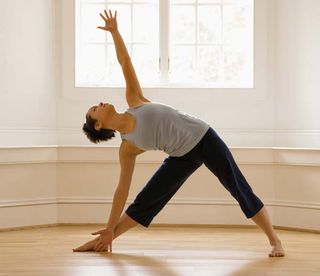Naked Yoga Stretches Self-Esteem, But Is It Healthy?

Yoga enthusiasts often turn to the exercise as a way to free their minds, but some are now seeking to free their bodies' as well — from clothes, that is.
Yes, going au naturel is the latest yoga trend. And while being naked around other yogis might sound more anxiety-inducing than stress-reliving, those who've done it say it can boost self-confidence and help people to accept and celebrate their bodies.
Shedding one's clothes brings a new level of honesty and authenticity to yoga — an authenticity that can sometimes get lost in the fashion and branding surrounding yoga, said Isis Phoenix, a yoga instructor at Naked Yoga NYC in New York City.
And the practice helps people let go, offering freedom from the constraints of life, which might include your job (or even just spandex), Phoenix said.
Some might feel self-conscious at first, but Phoenix has seen participants undergo a metamorphosis of sorts, a change only made possible by baring it all, she said.
"A new reality is created in the first 15 minutes of class — a reality where people can be naked and practice yoga in the room, and it's ok," Phoenix said. "Nobody's going to point and laugh," she said.
"In that first 15 minutes, I would say most people go through a transformation of holding that new reality really solidly, and that makes other things possible," including confronting their fears about their new experience, Phoenix said.
Sign up for the Live Science daily newsletter now
Get the world’s most fascinating discoveries delivered straight to your inbox.
Stretching boundaries
Phoenix started offering nude yoga in 2007. "Right away, people were attracted to it," she said.
"I would say it's a new trend," said Janet Konefal, assistant dean for complementary and integrative medicine at the University of Miami Miller School of Medicine, who researches yoga's health benefits. "I don't know too many people who were practicing it 10 or 20 years ago."
The practice may be becoming trendy in part because yoga is so popular right now, Phoenix said. Even the name itself creates intrigue. "Just the title 'naked yoga' is eye-catching — it's like, 'whoa, wait, what?'"
Some participants are nudists who want to try yoga for the first time. "So it's not the nude part that’s strange to them, it’s the yoga part," Phoenix said.
Others are yoga aficionados looking to "stretch themselves in a new way" by taking up naked yoga, Phoenix said.
Regardless of why they come, it's a chance for participants to "lay down their armor, in a sense," and breathe, stretch and mediate, Phoenix said.
Some people become more familiar with their own bodies, such as discovering a mole they never knew they had, Phoenix said.
"[There's] a level of living with your body your whole life and then really, truly seeing it for the first time," she said.
Health issues?
Experts agree there are psychological benefits to naked yoga, but not physical ones. "If you're wearing loose clothing or spandex, there's nothing to stop you from doing all the postures or stretches or movements in yoga with the proper clothes," Konefal said. "The sense of freedom is not a physical, it’s a psychological."
And the practice may present a potential health hazard if the yoga studio supplies mats other people have used. To avoid sanitization issues, you want to make sure to always use your own mat, Konefal said. (Naked Yoga NYC requires that all participants bring their own mats).
"You don’t want have a cut or nick and risk of infection," Konefal said.
Pass it on: Naked yoga is a new trend that may help participants accept and celebrate their bodies, but experts say the benefits are psychological.
This story was provided by MyHealthNewsDaily, sister site to LiveScience. Follow MyHealthNewsDaily staff writer Rachael Rettner on Twitter @RachaelRettner.

Rachael is a Live Science contributor, and was a former channel editor and senior writer for Live Science between 2010 and 2022. She has a master's degree in journalism from New York University's Science, Health and Environmental Reporting Program. She also holds a B.S. in molecular biology and an M.S. in biology from the University of California, San Diego. Her work has appeared in Scienceline, The Washington Post and Scientific American.
Most Popular

